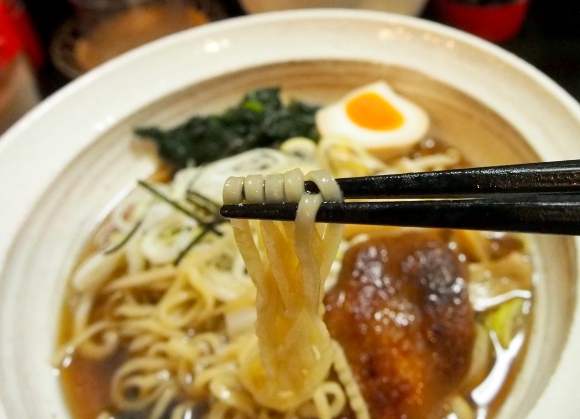
For decades, the international perception of ramen was that it was something for lazy college students to buy in bulk for when they wanted a quick, hot meal, with only minimal thought given to flavor or presentation. And while ramen does sometimes take that form, assuming it’s all like that is sort of like basing your whole image of pizza on microwavable frozen varieties.
Thankfully, there’s a ramen renaissance going on, as the rest of the world is getting onboard with just how delicious Japan’s favorite noodle dish can be. In response, some restaurants in Japan are adapting to make their food more accessible to foreign visitors, such as this restaurant in Tokyo that serves halal ramen.
Among the dietary rules that devout Muslims follow, the most well-known to those outside the faith are prohibitions against eating pork and drinking alcohol. That’s just the tip of the halal iceberg, though, as there are also regulations about how ingredients must be handled and prepared, and even what sort of utensils and kitchen equipment can be used as part of the cooking process.
All of this is in stark contrast to Japanese gastronomy, which aside from a long-past period where eating meat was frowned upon tends to take a pretty liberal attitude about what’s acceptable to chow down on. So when we heard about a halal-certified ramen restaurant called Naritaya in Asakusa, one of the most traditional parts of Tokyo, we decided to check it out.
From the outside, Naritaya, which is located in the Sensoji Nishisando shopping arcade that leads to the neighborhood’s famous Sensoji Temple, looks like any other old-school ramen joint. The same goes for the interior, with its row of wooden benches lined up in front of a counter. On your way inside, though, you might notice this seal of certification from the Japan Islamic Trust beside the door.
Like at many ramen restaurants, customers purchase a food ticket from a vending machine, then hand it over to the chef. We decided to go with the most basic menu item, called simply “ramen,” which was priced at a reasonable 700 yen (US$6).
Having never had halal ramen before, we weren’t entirely sure what to expect, but the bowl our server placed in front of us didn’t look remarkably different from what you’d find at a restaurant that gives no concerns to Islamic cooking practices. Aside from the broad noodles, we could spot nori seaweed, green onions, bean sprouts, spinach, a boiled egg, and the seasoned bamboo shoots called menma in Japanese.
What was unique, however, was that instead of chashu, the thin-sliced pork that’s customarily included with ramen, there was a strip of grilled chicken, which turned out to be both fragrant and delicious.
The broth didn’t disappoint either. Obviously, there’s no pork stock tonkotsu on the menu at Naritaya. Instead, the broth is made from bonito and kombu (kelp). The resulting taste is refreshing and light, but still with plenty of palate-pleasing potency. Actually, it’s pretty similar to what you’ll find in some of Tokyo’s more old-fashioned ramen restaurants.
The flavor is so well-rounded that we can’t imagine anyone not enjoying it. Being one of, if not the, only halal ramen restaurants in Tokyo, though, means that its especially popular with Muslim diners, and the staff told us that 80 percent of their customers are Islamic. In turn, that’s why in addition to more seating on the second floor, Naritaya also has a prayer room that patrons can use.
▼ There’s even an arrow on the ceiling pointing the way to Mecca.
It’s just one more aspect of Naritaya’s international outlook, which is also the basis for its posted English explanations of all the different ways to customize your noodles.
So if you find your stomach rumbling after a day of seeing the sights in Asakusa and/or Ramadan fasting, stop on by.
Restaurant information
Naritaya / 成田屋
Address: Toyko-to, Taito-ku, Asakusa 2-7-13
東京都台東区浅草2-7-13
Open 11 a.m.-10 p.m. Monday-Friday, 8 a.m.-8 p.m. Saturday/Sunday
Photos: RocketNews24
[ Read in Japanese ]


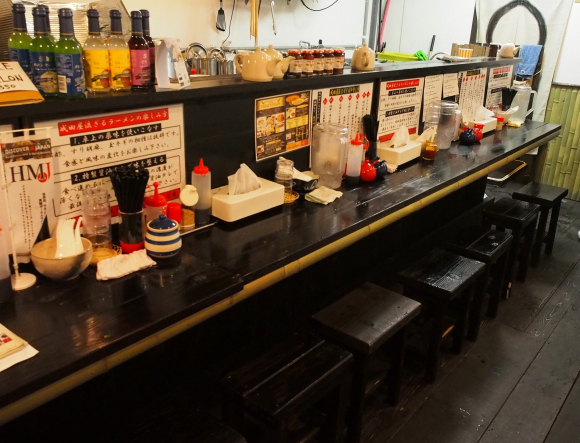
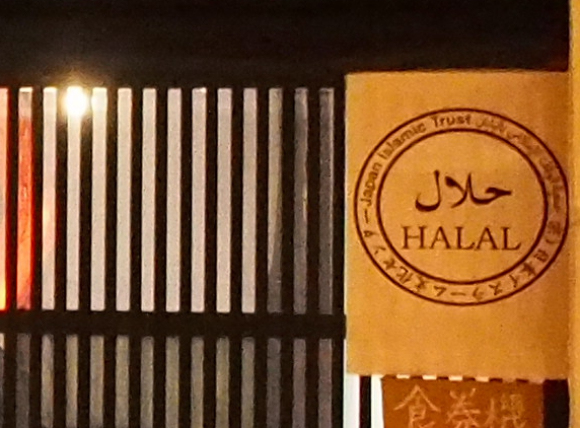
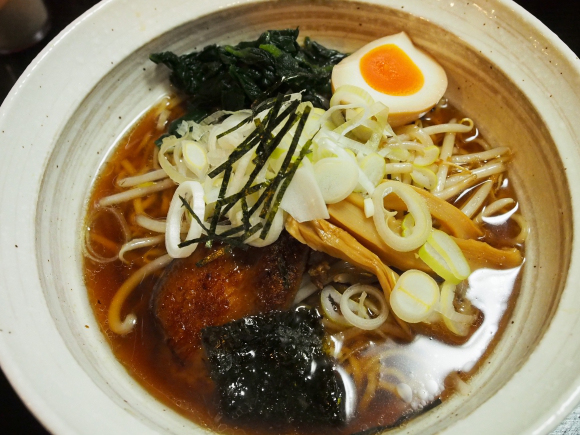
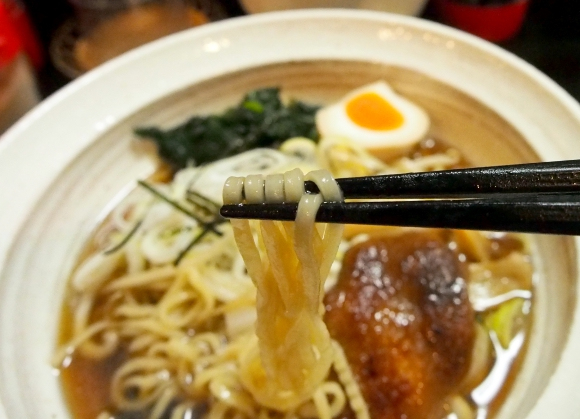
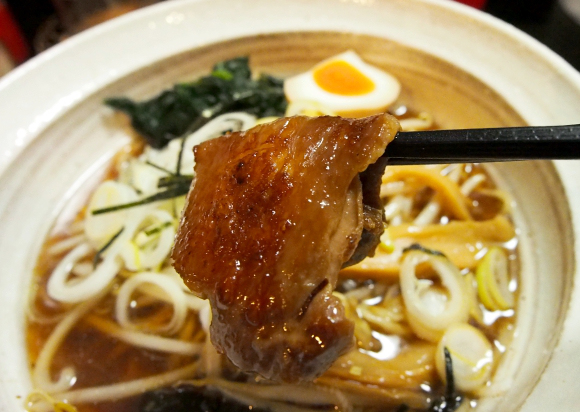
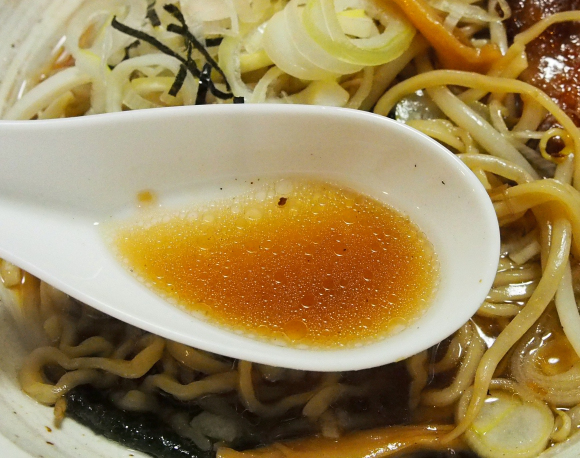
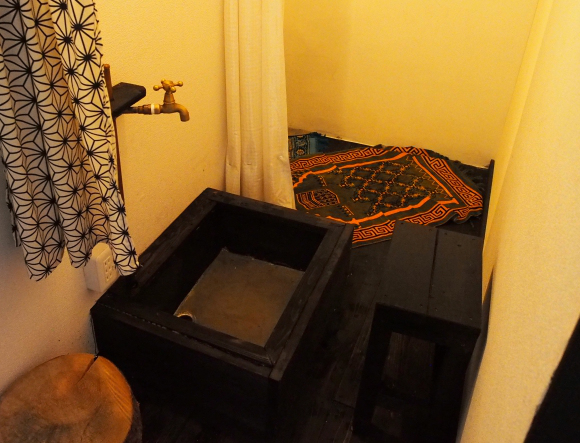
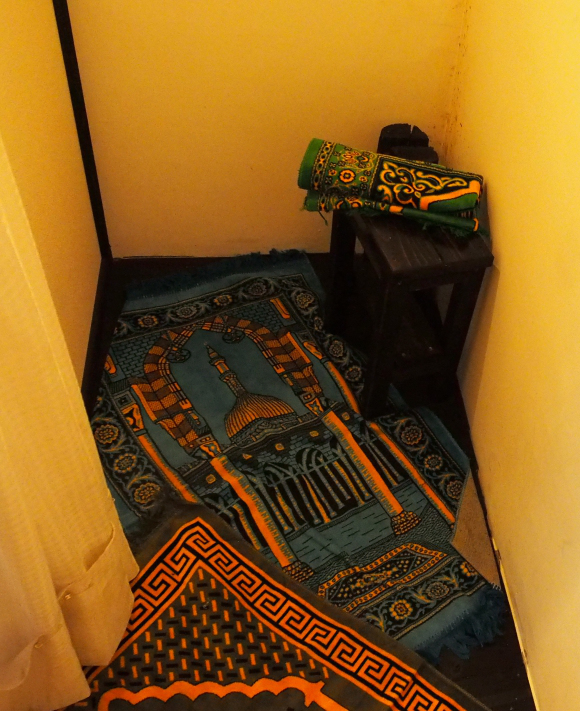
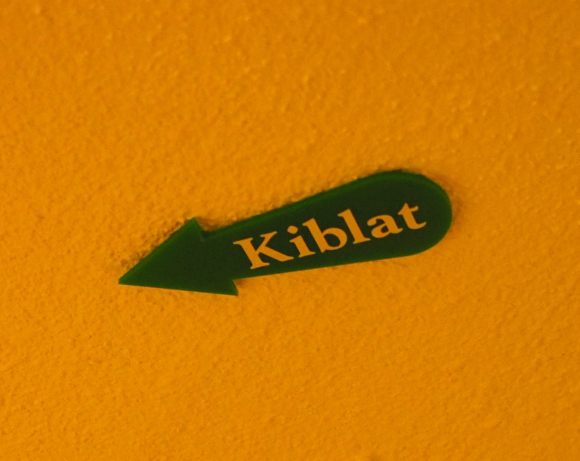
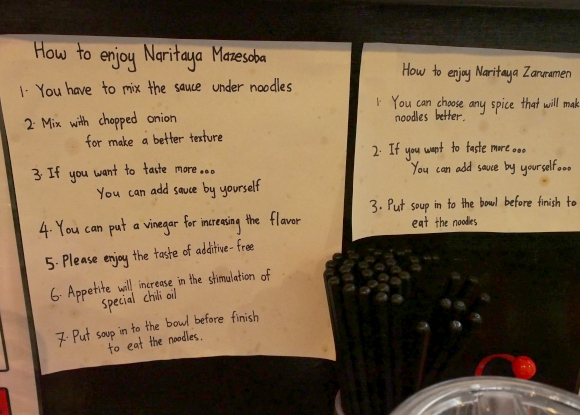
 Tokyo yakiniku restaurant begins offering halal course meals for Islamic diners
Tokyo yakiniku restaurant begins offering halal course meals for Islamic diners Mr. Sato goes halal at new CoCo Ichibanya that caters to Muslim diners
Mr. Sato goes halal at new CoCo Ichibanya that caters to Muslim diners Tokyo all-you-can-eat ramen buffet costs less than 10 bucks and is near city’s most famous temple
Tokyo all-you-can-eat ramen buffet costs less than 10 bucks and is near city’s most famous temple Tokyo ramen restaurant’s made-to-order noodles are only the beginning of its awesomeness
Tokyo ramen restaurant’s made-to-order noodles are only the beginning of its awesomeness Cold ramen? Yes, it’s possible, and yes, it’s awesome, as this Tokyo restaurant proves
Cold ramen? Yes, it’s possible, and yes, it’s awesome, as this Tokyo restaurant proves Japanese drugstore sells onigiri at pre-stupid era prices, but how do they compare to 7-Eleven?
Japanese drugstore sells onigiri at pre-stupid era prices, but how do they compare to 7-Eleven? Starbucks Japan releases first-ever Hinamatsuri Girls’ Day Frappuccino
Starbucks Japan releases first-ever Hinamatsuri Girls’ Day Frappuccino Japan Extreme Budget Travel! A trip from Tokyo to Izumo for just 30,000 yen [Part 1]
Japan Extreme Budget Travel! A trip from Tokyo to Izumo for just 30,000 yen [Part 1] What’s the best way to spend 1,000 yen at Denny’s in Japan?
What’s the best way to spend 1,000 yen at Denny’s in Japan? Magical senzu beans from Dragon Ball now available in chocolate form!
Magical senzu beans from Dragon Ball now available in chocolate form! Naruto and Converse team up for new line of shinobi sneakers[Photos]
Naruto and Converse team up for new line of shinobi sneakers[Photos] A look back on 40 years of Japanese schools banning stuff
A look back on 40 years of Japanese schools banning stuff The Hayao Miyazaki anime we never got – New art book reveals Ghibli legend’s unrealized concepts
The Hayao Miyazaki anime we never got – New art book reveals Ghibli legend’s unrealized concepts 7-Eleven Japan’s sakura sweets season is underway right now!
7-Eleven Japan’s sakura sweets season is underway right now! Japan Extreme Budget Travel! A trip from Tokyo to Izumo for just 30,000 yen [Part 2]
Japan Extreme Budget Travel! A trip from Tokyo to Izumo for just 30,000 yen [Part 2] The 10 most annoying things foreign tourists do on Japanese trains, according to locals
The 10 most annoying things foreign tourists do on Japanese trains, according to locals Highest Starbucks in Japan set to open this spring in the Tokyo sky
Highest Starbucks in Japan set to open this spring in the Tokyo sky Tokyo Skytree turns pink for the cherry blossom season
Tokyo Skytree turns pink for the cherry blossom season Starbucks Japan releases new sakura goods and drinkware for cherry blossom season 2026
Starbucks Japan releases new sakura goods and drinkware for cherry blossom season 2026 Japan’s new “Cunte” contact lenses aren’t pronounced like you’re probably thinking they are
Japan’s new “Cunte” contact lenses aren’t pronounced like you’re probably thinking they are Shibuya Station’s Hachiko Gate and Yamanote Line stairway locations change next month
Shibuya Station’s Hachiko Gate and Yamanote Line stairway locations change next month Yakuzen ramen restaurant in Tokyo is very different to a yakuza ramen restaurant
Yakuzen ramen restaurant in Tokyo is very different to a yakuza ramen restaurant Starbucks Japan adds new sakura Frappuccino and cherry blossom drinks to the menu
Starbucks Japan adds new sakura Frappuccino and cherry blossom drinks to the menu Japan just had its first same-month foreign tourist decrease in four years
Japan just had its first same-month foreign tourist decrease in four years Burning through cash just to throw things away tops list of headaches when moving house in Japan
Burning through cash just to throw things away tops list of headaches when moving house in Japan Japan’s newest Shinkansen has no seats…or passengers [Video]
Japan’s newest Shinkansen has no seats…or passengers [Video] Foreigners accounting for over 80 percent of off-course skiers needing rescue in Japan’s Hokkaido
Foreigners accounting for over 80 percent of off-course skiers needing rescue in Japan’s Hokkaido Super-salty pizza sends six kids to the hospital in Japan, linguistics blamed
Super-salty pizza sends six kids to the hospital in Japan, linguistics blamed Starbucks Japan unveils new sakura Frappuccino for cherry blossom season 2026
Starbucks Japan unveils new sakura Frappuccino for cherry blossom season 2026 Foreign tourists in Japan will get free Shinkansen tickets to promote regional tourism
Foreign tourists in Japan will get free Shinkansen tickets to promote regional tourism Take a trip to Japan’s Dododo Land, the most irritating place on Earth
Take a trip to Japan’s Dododo Land, the most irritating place on Earth Is China’s don’t-go-to-Japan warning affecting the lines at a popular Tokyo gyukatsu restaurant?
Is China’s don’t-go-to-Japan warning affecting the lines at a popular Tokyo gyukatsu restaurant? Survey asks foreign tourists what bothered them in Japan, more than half gave same answer
Survey asks foreign tourists what bothered them in Japan, more than half gave same answer Japan’s human washing machines will go on sale to general public, demos to be held in Tokyo
Japan’s human washing machines will go on sale to general public, demos to be held in Tokyo Starbucks Japan releases new drinkware and goods for Valentine’s Day
Starbucks Japan releases new drinkware and goods for Valentine’s Day We deeply regret going into this tunnel on our walk in the mountains of Japan
We deeply regret going into this tunnel on our walk in the mountains of Japan Studio Ghibli releases Kodama forest spirits from Princess Mononoke to light up your home
Studio Ghibli releases Kodama forest spirits from Princess Mononoke to light up your home Major Japanese hotel chain says reservations via overseas booking sites may not be valid
Major Japanese hotel chain says reservations via overseas booking sites may not be valid Put sesame oil in your coffee? Japanese maker says it’s the best way to start your day【Taste test】
Put sesame oil in your coffee? Japanese maker says it’s the best way to start your day【Taste test】 No more using real katana for tourism activities, Japan’s National Police Agency says
No more using real katana for tourism activities, Japan’s National Police Agency says We eat at Japan’s first-ever ramen restaurant, finally reopened after 44 years
We eat at Japan’s first-ever ramen restaurant, finally reopened after 44 years Tokyo restaurant serves up unusual ramen with blue chicken broth
Tokyo restaurant serves up unusual ramen with blue chicken broth Tonkotsu ramen chain Ichiran set to open first-ever non-pork broth restaurant in Tokyo
Tonkotsu ramen chain Ichiran set to open first-ever non-pork broth restaurant in Tokyo This might be the simplest restaurant ramen in all of Japan, but it’s still something special
This might be the simplest restaurant ramen in all of Japan, but it’s still something special Yakuzen ramen restaurant in Tokyo is very different to a yakuza ramen restaurant
Yakuzen ramen restaurant in Tokyo is very different to a yakuza ramen restaurant Instant Ramen Maker Sets up Tiny Restaurant in Shibuya Station: Three Dollar Lunch, Anyone?
Instant Ramen Maker Sets up Tiny Restaurant in Shibuya Station: Three Dollar Lunch, Anyone? Gluten-free ramen now on the menu at Japan’s ramen museum
Gluten-free ramen now on the menu at Japan’s ramen museum Are you game enough to eat Fire Ramen at this Japanese restaurant in Kyoto?
Are you game enough to eat Fire Ramen at this Japanese restaurant in Kyoto? Lobster ramen in Tokyo is amazingly good and amazingly cheap【Photos】
Lobster ramen in Tokyo is amazingly good and amazingly cheap【Photos】 Second ramen restaurant in Tokyo receives Michelin star for 2017
Second ramen restaurant in Tokyo receives Michelin star for 2017 One of Kyoto’s best secret ramen restaurants isn’t a restaurant at all – it’s a van!
One of Kyoto’s best secret ramen restaurants isn’t a restaurant at all – it’s a van! Tokyo’s biggest ramen secret? This restaurant just might be the next Michelin star winner
Tokyo’s biggest ramen secret? This restaurant just might be the next Michelin star winner Japan’s first-ever ramen restaurant, which closed 44 years ago, is reopening this fall!
Japan’s first-ever ramen restaurant, which closed 44 years ago, is reopening this fall! Tokyo’s best ramen breakfast? Restaurant two minutes from Tokyo Station is a strong contender
Tokyo’s best ramen breakfast? Restaurant two minutes from Tokyo Station is a strong contender Want to eat ramen and sushi together? New restaurant in Tokyo makes culinary dreams come true
Want to eat ramen and sushi together? New restaurant in Tokyo makes culinary dreams come true